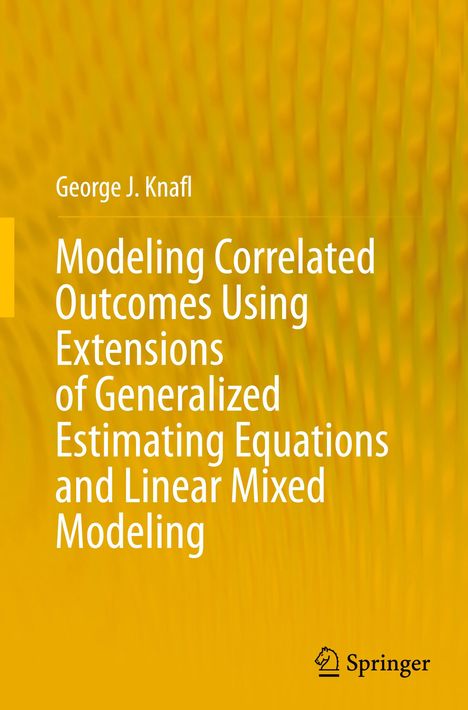George J. Knafl: Modeling Correlated Outcomes Using Extensions of Generalized Estimating Equations and Linear..., Gebunden
Modeling Correlated Outcomes Using Extensions of Generalized Estimating Equations and Linear Mixed Modeling
(soweit verfügbar beim Lieferanten)
- Verlag:
- Springer International Publishing, 01/2024
- Einband:
- Gebunden, HC runder Rücken kaschiert
- Sprache:
- Englisch
- ISBN-13:
- 9783031419874
- Artikelnummer:
- 11743261
- Umfang:
- 544 Seiten
- Nummer der Auflage:
- 24001
- Ausgabe:
- 1st edition 2023
- Gewicht:
- 975 g
- Maße:
- 241 x 160 mm
- Stärke:
- 35 mm
- Erscheinungstermin:
- 25.1.2024
- Hinweis
-
Achtung: Artikel ist nicht in deutscher Sprache!
Weitere Ausgaben von Modeling Correlated Outcomes Using Extensions of Generalized Estimating Equations and Linear Mixed Modeling |
Preis |
|---|---|
| Buch, Kartoniert / Broschiert, Englisch | EUR 153,32* |
Klappentext
This book formulates methods for modeling continuous and categorical correlated outcomes that extend the commonly used methods: generalized estimating equations (GEE) and linear mixed modeling. Partially modified GEE adds estimating equations for variance / dispersion parameters to the standard GEE estimating equations for the mean parameters. Fully modified GEE provides alternate estimating equations for mean parameters as well as estimating equations for variance / dispersion parameters. The new estimating equations in these two cases are generated by maximizing a "likelihood" function related to the multivariate normal density function. Partially modified GEE and fully modified GEE use the standard GEE approach to estimate correlation parameters based on the residuals. Extended linear mixed modeling (ELMM) uses the likelihood function to estimate not only mean and variance / dispersion parameters, but also correlation parameters. Formulations are provided for gradient vectors and Hessianmatrices, for a multi-step algorithm for solving estimating equations, and model-based and robust empirical tests for assessing theory-based models.
Standard GEE, partially modified GEE, fully modified GEE, and ELMM are demonstrated and compared using a variety of regression analyses of different types of correlated outcomes. Example analyses of correlated outcomes include linear regression for continuous outcomes, Poisson regression for count / rate outcomes, logistic regression for dichotomous outcomes, exponential regression for positive-valued continuous outcome, multinomial regression for general polytomous outcomes, ordinal regression for ordinal polytomous outcomes, and discrete regression for discrete numeric outcomes. These analyses also address nonlinearity in predictors based on adaptive search through alternative fractional polynomial models controlled by likelihood cross-validation (LCV) scores. Larger LCV scores indicate better models but not necessarilydistinctly better models. LCV ratio tests are used to identify distinctly better models.
A SAS macro has been developed for analyzing correlated outcomes using standard GEE, partially modified GEE, fully modified GEE, and ELMM within alternative regression contexts. This macro and code for conducting the analyses addressed in the book are available online via the book¿s Springer website. Detailed descriptions of how to use this macro and interpret its output are provided in the book.



